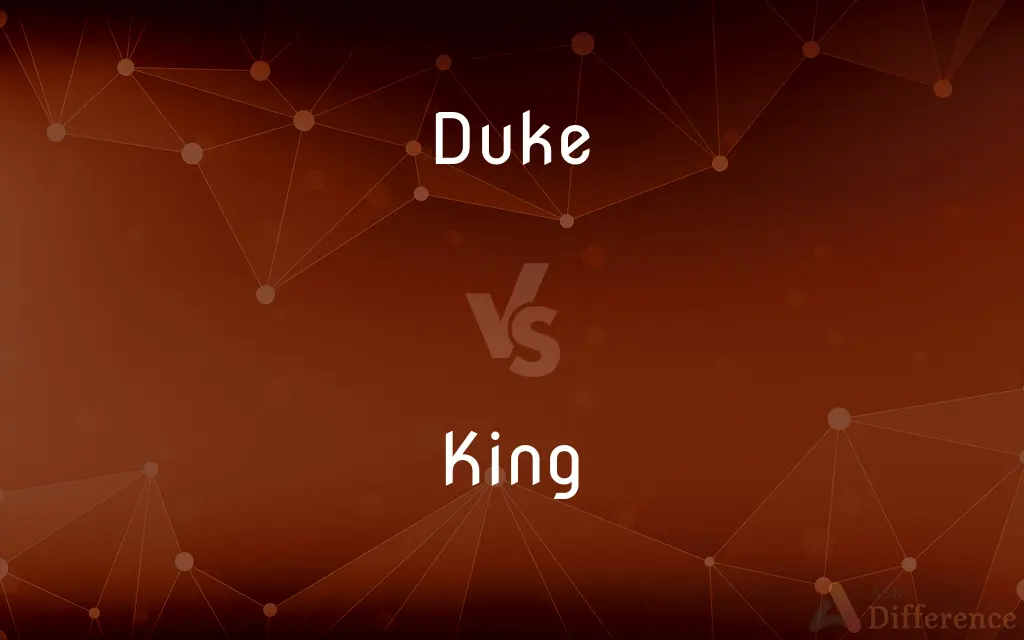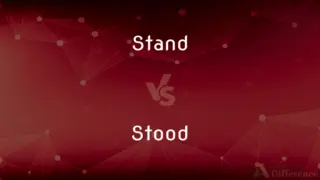Duke vs. King — What's the Difference?
Edited by Tayyaba Rehman — By Maham Liaqat — Updated on March 31, 2024
A duke is a high-ranking noble, below a monarch, while a king is the highest-ranking ruler in a monarchy, often holding sovereign power.

Difference Between Duke and King
Table of Contents
ADVERTISEMENT
Key Differences
A king stands at the pinnacle of the hierarchical structure in a monarchy, embodying sovereignty and the ultimate authority over a nation or kingdom. A duke, while holding significant power and land, ranks below a monarch and typically governs a portion of the realm.
Kings often possess the right to make laws, levy taxes, and declare war, exercising supreme control over their territories. Dukes, on the other hand, manage their duchies, overseeing local affairs and maintaining the king's law, but they do not possess the sovereign powers of a king.
The title of a king is inherited through a royal bloodline or achieved through conquest, symbolizing the continuity of a dynasty or the establishment of a new one. Dukes usually acquire their titles through inheritance or appointment by the monarch, signifying recognition of nobility or reward for loyalty.
Kings are central figures in state ceremonies and symbols of national unity, embodying the identity and continuity of the nation. Dukes play significant roles within their regions, contributing to the cultural and social development of their territories, but they do not embody the nation as a whole.
While a king's authority is recognized internationally, granting them the ability to engage in diplomacy and treaties, a duke's influence is primarily domestic, focused on regional governance and the welfare of their subjects.
ADVERTISEMENT
Comparison Chart
Rank
High-ranking noble, below a monarch.
Highest-ranking ruler in a monarchy.
Authority
Governs a portion of the realm.
Sovereign power over a nation.
Power
Manages local affairs, upholds king’s law.
Makes laws, levies taxes, declares war.
Title Acquisition
Inherited or appointed by the monarch.
Inherited through royal bloodline or conquest.
Role in State
Focus on regional development and welfare.
Symbol of national unity and identity.
Compare with Definitions
Duke
Plays a key role in the cultural and social development of their region.
The duke founded a university to promote education and arts in the duchy.
King
A male monarch of a nation or kingdom, possessing supreme authority.
The king decreed a new law to improve national security.
Duke
Manages the affairs of a duchy, including justice and economic development.
The duke hosted a summit to attract investors to the region.
King
Represents the state and national identity, often involved in ceremonial functions.
The king's speech on Independence Day united the people.
Duke
Reflects nobility, often granted as a reward for loyalty or service to the crown.
The monarch appointed him duke for his bravery in battle.
King
Engages in international diplomacy and treaties as the head of state.
The king hosted foreign dignitaries to strengthen international relations.
Duke
A nobleman of the highest rank below a monarch, overseeing a specific territory.
The duke implemented reforms to boost agriculture in his duchy.
King
The kingship often passes through a royal dynasty, symbolizing historical continuity.
The king is the latest in a centuries-old royal lineage.
Duke
Holds considerable influence within their territory but limited outside it.
The duke's initiatives significantly reduced poverty in his duchy.
King
Has the ultimate decision-making power within the realm.
The king declared war in response to the invasion.
Duke
Duke is a male title either of a monarch ruling over a duchy, or of a member of royalty, or nobility. As rulers, dukes are ranked below emperors, kings, and grand dukes.
King
King is the title given to a male monarch in a variety of contexts. The female equivalent is queen, which title is also given to the consort of a king.
Duke
A nobleman with the highest hereditary rank, especially a man of the highest grade of the peerage in Great Britain.
King
A male sovereign.
Duke
A sovereign prince who rules an independent duchy in some European countries.
King
One that is supreme or preeminent in a particular group, category, or sphere
"In many countries, soccer is the king of sports" (Cameron W. Barr).
Duke
Used as the title for such a nobleman.
King
A man chosen as the winner of a contest or the honorary head of an event
A homecoming king.
Duke
Dukes(Slang) The fists
Put up your dukes!.
King
Abbr. K A playing card bearing the figure of a king, ranking above a queen.
Duke
(Botany) A type of cherry intermediate between a sweet and a sour cherry.
King
Abbr. K The principal chess piece, which can move one square in any direction and must be protected against checkmate.
Duke
To fight, especially with fists
Duking it out.
King
A piece in checkers that has been moved to the last row on the opponent's side of the board and been crowned, thus becoming free to move both forward and backward.
Duke
The male ruler of a duchy (female equivalent: duchess).
King
Kings(used with a sing. verb) See Table at Bible.
Duke
The sovereign of a small state.
King
A king-size bed.
Duke
A high title of nobility; the male holder of a dukedom.
King
Principal or chief, as in size or importance.
Duke
A grand duke.
King
Of or relating to a king-size bed
King sheets.
A king bed skirt.
Duke
Any of various nymphalid butterflies of the Asian genera Bassarona and Dophla.
King
To make (a piece in checkers) into a king; crown.
Duke
A fist.
Put up your dukes!
King
A male monarch; a man who heads a monarchy. If it is an absolute monarchy, then he is the supreme ruler of his nation.
Henry VIII was the king of England from 1509 to 1547.
Duke
To hit or beat with the fists.
King
A powerful or majorly influential person.
Howard Stern styled himself as the "king of all media".
Duke
To give cash to; to give a tip to.
I duked him twenty dollars.
King
Something that has a preeminent position.
In times of financial panic, cash is king.
Duke
A leader; a chief; a prince.
Hannibal, duke of Carthage.
All were dukes once, who were "duces" - captains or leaders of their people.
King
A component of certain games.
Duke
In England, one of the highest order of nobility after princes and princesses of the royal blood and the four archbishops of England and Ireland.
King
(chess) The principal chess piece, that players seek to threaten with unavoidable capture to result in a victory by checkmate. It is often the tallest piece, with a symbolic crown with a cross at the top.
Duke
In some European countries, a sovereign prince, without the title of king.
King
(card games) A playing card with the letter "K" and the image of a king on it, the thirteenth card in a given suit.
Duke
The fists; as, put up your dukes.
King
A checker (a piece of checkers/draughts) that reached the farthest row forward, thus becoming crowned (either by turning it upside-down, or by stacking another checker on it) and gaining more freedom of movement.
Duke
To play the duke.
Lord Angelo dukes it well in his absence.
King
The central pin or skittle in bowling games.
Duke
To beat with the fists.
King
A king skin.
Oi mate, have you got kings?
Duke
A British peer of the highest rank
King
A male dragonfly; a drake.
Duke
A nobleman (in various countries) of high rank
King
A king-sized bed.
King
(graph theory) A vertex in a directed graph which can reach every other vertex via a path with a length of at most 2.
King
To crown king, to make (a person) king.
King
To rule over as king.
King
To perform the duties of a king.
King
To assume or pretend preeminence (over); to lord it over.
King
To promote a piece of draughts/checkers that has traversed the board to the opposite side, that piece subsequently being permitted to move backwards as well as forwards.
King
To dress and perform as a drag king.
King
A Chinese musical instrument, consisting of resonant stones or metal plates, arranged according to their tones in a frame of wood, and struck with a hammer.
King
A chief ruler; a sovereign; one invested with supreme authority over a nation, country, or tribe, usually by hereditary succession; a monarch; a prince.
Kings will be tyrants from policy, when subjects are rebels from principle.
There was a State without king or nobles.
But yonder comes the powerful King of Day,Rejoicing in the east
King
One who, or that which, holds a supreme position or rank; a chief among competitors; as, a railroad king; a money king; the king of the lobby; the king of beasts.
King
A playing card having the picture of a king{1}; as, the king of diamonds.
King
The chief piece in the game of chess.
King
A crowned man in the game of draughts.
King
The title of two historical books in the Old Testament.
King
To supply with a king; to make a king of; to raise to royalty.
Those traitorous captains of Israel who kinged themselves by slaying their masters and reigning in their stead.
King
A male sovereign; ruler of a kingdom
King
A competitor who holds a preeminent position
King
A very wealthy or powerful businessman;
An oil baron
King
Preeminence in a particular category or group or field;
The lion is the king of beasts
King
United States woman tennis player (born in 1943)
King
United States guitar player and singer of the blues (born in 1925)
King
United States charismatic civil rights leader and Baptist minister who campaigned against the segregation of Blacks (1929-1968)
King
A checker that has been moved to the opponent's first row where it is promoted to a piece that is free to move either forward or backward
King
One of the four playing cards in a deck bearing the picture of a king
King
(chess) the weakest but the most important piece
Common Curiosities
What distinguishes a king's power from that of a duke?
A king has sovereign power over a nation, while a duke governs a portion of the realm under the king's authority.
What is the role of a king in modern monarchies?
In constitutional monarchies, kings often have ceremonial roles, while executive powers rest with elected officials.
Do dukes have any say in national affairs?
Dukes may have influence in national affairs, especially if they are members of the royal council or parliament, but their primary responsibilities are regional.
Can a duke become a king?
Yes, but it usually requires significant changes in the political structure, such as marriage into the royal family, conquest, or election in elective monarchies.
What is the historical origin of dukes?
The title of duke has Roman origins, initially denoting military commanders before evolving into a noble rank in medieval Europe.
How does one become a duke?
Titles of duke are usually inherited or granted by the monarch as a recognition of nobility or service.
What symbols represent kings and dukes?
Kings often have crowns, scepters, and thrones as symbols, while dukes may have coronets and heraldic insignias specific to their duchies.
How does the authority of a duke compare internationally?
A duke's authority is generally recognized only within their own country, unlike a king, who is recognized internationally.
What legal powers do dukes have within their duchies?
Dukes traditionally had judicial and legislative powers within their territories, though this varies significantly in contemporary times.
Are there female equivalents to kings and dukes?
Yes, the female equivalent of a king is a queen, and for a duke, it is a duchess.
Can the titles of king and duke coexist in the same country?
Yes, kings and dukes often coexist in monarchies, with dukes ruling portions of the country under the king’s sovereignty.
Do kings and dukes have courts?
Yes, both kings and dukes may have their own courts, though a king's court is typically more significant and central to national governance.
How do kings contribute to their country's international standing?
Kings can elevate a country's international profile through diplomacy, state visits, and participation in global events.
How is succession determined for kings and dukes?
Succession laws vary, but it typically involves primogeniture, where the eldest son or child inherits the title.
What are the responsibilities of a duke to the king?
Dukes are often tasked with defending the realm, managing their territories efficiently, and providing counsel to the king.
Share Your Discovery

Previous Comparison
Incur vs. Occur
Next Comparison
Stand vs. StoodAuthor Spotlight
Written by
Maham LiaqatEdited by
Tayyaba RehmanTayyaba Rehman is a distinguished writer, currently serving as a primary contributor to askdifference.com. As a researcher in semantics and etymology, Tayyaba's passion for the complexity of languages and their distinctions has found a perfect home on the platform. Tayyaba delves into the intricacies of language, distinguishing between commonly confused words and phrases, thereby providing clarity for readers worldwide.
















































